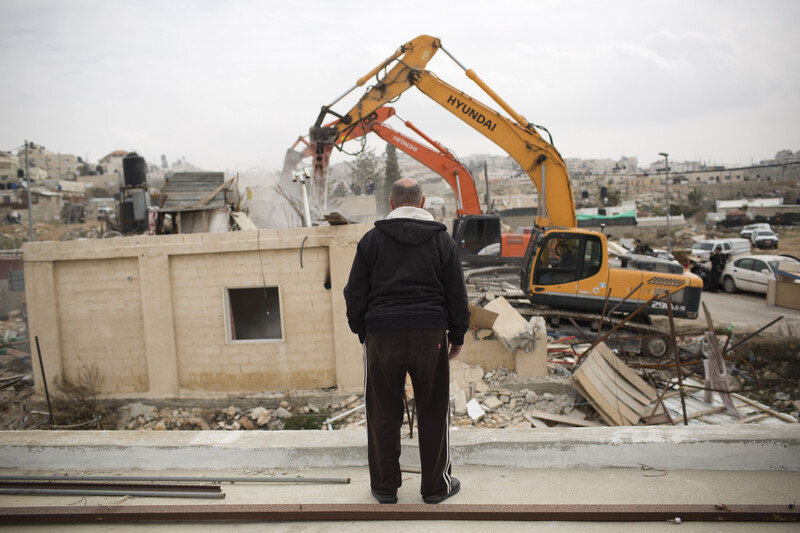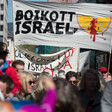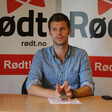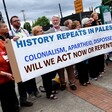Rights and Accountability 14 December 2016

Hyundai equipment is used to destroy a home in the occupied East Jerusalem neighborhood of Beit Hanina in January 2014.
ActiveStillsIn September, Israeli forces demolished the home of Bassam Ibrahim. What made his case different from the more than 48,000 such demolitions in territory Israel has occupied since 1967 is that Ibrahim is not Palestinian. He is Syrian.
Ibrahim’s home in the town of Majdal Shams was the first demolition in the Golan Heights since Israel occupied the Syrian territory following its capture in 1967.
The Fourth Geneva Convention prohibits the destruction of property by an occupying power except in the case of military necessity.
Equipment manufactured by Hyundai Heavy Industries was used to carry out the demolition.
Under pressure
Headquartered in South Korea, Hyundai is one of the top five heavy equipment manufacturers worldwide. It is not the first time its equipment has been used in Israeli violations of international law.
Under pressure from Palestine Peace and Solidarity, a Korean solidarity group, the company pledged in 2013 to cease dealing with its Israeli distributor, Automotive Equipment Group, stating that its excavators were intended for “the private sector, but not for military purposes.”
But one year later, Palestine Peace and Solidarity confirmed that Hyundai had resumed distribution through another Israeli company, EFCO, and continued to profit from the use of its machinery in house demolitions and other violations of international law.
The research group Who Profits reports that Hyundai machinery has also been used in the construction and expansion of Israeli settlements, making the company’s profits in the region “contingent upon land grab, forced displacement and at times even settler or state violence.”
The demolition of Bassam Ibrahim’s home in the Golan followed a pattern similar to those in the occupied West Bank.
According to Al-Marsad, a human rights group in the Golan, hundreds of Israeli police and special forces surrounded the home as it was destroyed on the pretext that it was built without a permit.
Dozens more Syrian-owned homes in the territory have also received demolition orders.
More than 140,000 Syrians lived in the Golan Heights, approximately 1,860 square kilometers, before its capture in 1967. Most were forcibly transferred outside the territory, and only 20,000 remain today.
Discriminatory Israeli policies make it virtually impossible for residents to obtain permits to build or improve their homes. Many have no choice but to build without them.
Syrian communities in the Golan are also being squeezed by Israel’s expansion of Hermon National Park. Authorities have moved to appropriate 20,000 acres of land used by Majdal Shams and other communities for agriculture and housing.
This expansion would surround these communities to the north and west. Already hemmed in to the east by the militarized boundary with the rest of Syria, this would only leave land in the south for urban expansion. That land is used for agriculture, “a main source of livelihood for the local Syrian population,” according to al-Marsad.
Settlements expand
The number of Jewish settlers in the Golan is now roughly equal to that of the Syrian population.
In October, Israel approved the construction of 1,600 new housing units in Katzrin, the largest settlement in the Golan. It was built on the land of the Syrian villages Qasrin, Shqef and Sanawber, which were depopulated by Israeli forces in 1967.
Israel has capitalized on the ongoing conflict in Syria to seek international recognition of its annexation of the Golan Heights.
These efforts were rebuffed by the UN Security Council, which in April reaffirmed Resolution 497 declaring that Israel’s annexation of the Golan was “null and void and without international legal effect.”
Yet since that declaration was made in 1981, Israel has tightened its grip through settlement enterprises such as the Golan Heights Winery and Eden Springs mineral water which exploit the territory’s natural resources.
Afek, a subsidiary of US-based Genie Energy, is drilling for oil in the Golan.
Afek’s president, Effie Eitam, is a settler living in the Golan Heights and a former general in Israel’s military.
Genie’s advisory board includes former US Vice President Dick Cheney, media mogul Rupert Murdoch, as well as former Clinton administration officials: treasury secretary Larry Summers, UN ambassador Bill Richardson and CIA director James Woolsey.





Comments
Volvo and Caterpillar bulldozers
Permalink Blake replied on
Are also involved in demolitions of Palestinian property.
Hyundai
Permalink larry white replied on
darn , I was really looking forward to driving a new I 40 but having learned this I could hardly enjoy driving around in a vehicle that was made by a company involved in the oppression of millions of Palestinians.
Looks as if I will have to go back to kicking tires for another while.